Incluvie Foundation Gala - Learn More
Review: ‘The Trial of the Chicago 7’
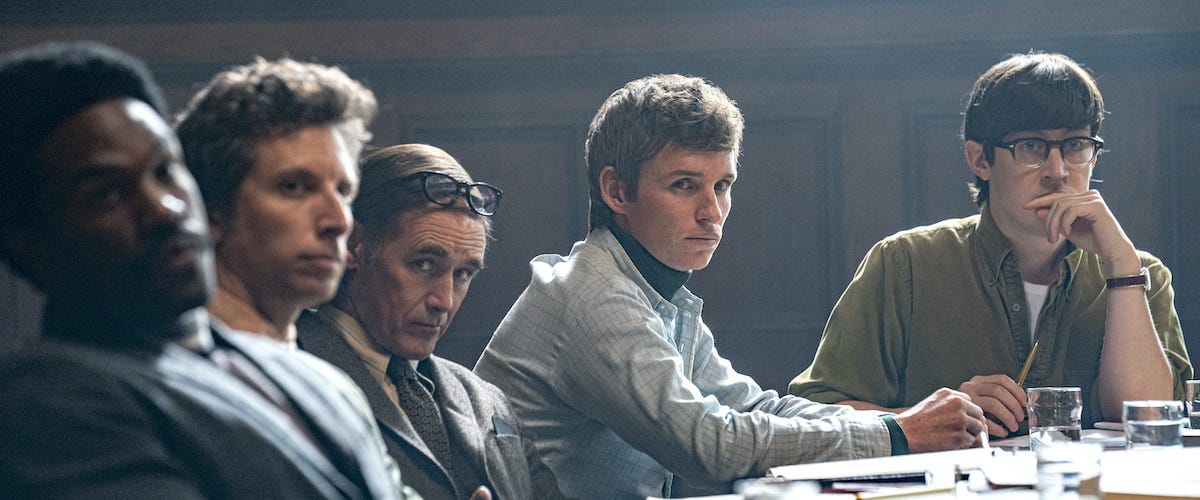
While this isn’t quite the ideal Black History Month watch, The Trial of the Chicago 7covers a very real history of protesting in America from the perspective of the 1968 Democratic National Convention protestors. While these protests looked very different from the ones America saw in the summer of 2020, protestors risked their lives to have their voices heard in protest against the Vietnam War. With a mostly white ensemble cast, there are still themes that emphasize the racism of this time and in this specific trial. The film, while criticized for not being completely accurate to the real trial from 1969, tells the story of the seven white men held responsible for the Chicago riots in 1968. In the same trial (according to the film), Bobby Seal, (Yahya Abdul-Mateen II) co-founder of the Black Panther Party, was tried without legal counsel for the majority of the trial, charged with several accounts of Contempt of Court, and was bound and gagged in the courtroom for his “misbehavior.” The film focuses on the seven white men who were actually responsible for causing the riots and comments on the extreme racism present through the trial by using Bobby Seal as a type of scape-goat. The re-living of this historic trial through this film is relevant to current politics and disturbingly enjoyable to watch due to the excellent performances from the ensemble cast. If you like a juicy courtroom drama, this film will definitely scratch that itch in a really chilling manner.
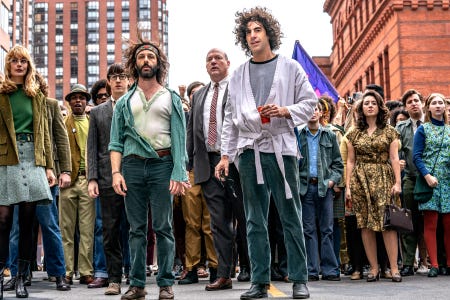
Written and directed by Aaron Sorkin, this well-crafted ensemble film perfectly cast two all-star actors in the two most interesting roles in the film. With Sascha Baron Cohen as Abbie Hoffman, co-founder of the Youth International Party (aka “Yippies) and Eddie Redmayne as Tom Hayden, founder of the activist organization Students for a Democratic Society (SDS), there were definitely some excellent performances sprinkled throughout this film. While some of the ensemble scenes had all the white men on trial blending together, these two stars, given their important roles in the screen-play and the trial, stood out often. Other standout performances were by the Lawyer representing the Chicago 7, William Kunstler, played by Mark Rylance as well as a defense attorney representing the people, Richard Schultz played by THE Joseph Gordon-Levitt. The opposition between the Chicago 7 and the people was very layered and the attorney Richard Schultz’s character fell into an interesting theme of good vs. evil while he questioned his ability to win this case. Yahya Abdul-Mateen II’s performance as Bobby Seal was definitely notable but not nearly the center-piece of the film. Part of me wished for more character involvement from the only BIPOC actor in the principal cast, but alas; this was a movie about white men, so this wasn’t expected.
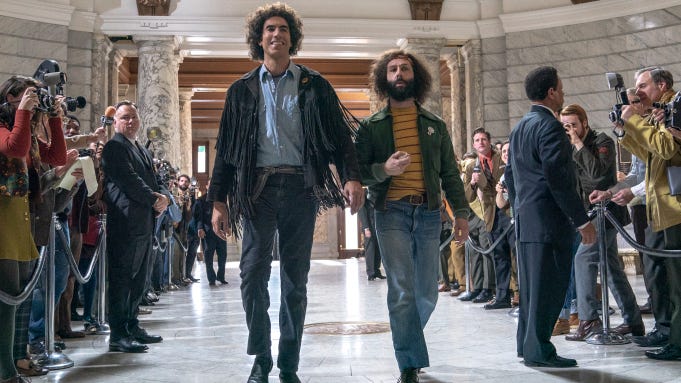
The most noteworthy element of this film for me was the screenplay. I think the source material of the actual trial as well as other documentation from the riots and interviews with the 7 was a really excellent catalyst for Sorkin’s work on this screen-play; however, he diverges from it almost completely. According to an article by Jason Bailey of the New York Times, “Sorkin diverges markedly from the transcripts, and though trace elements of the text remain, he mostly rewrites the events in (and out of) the courtroom with his distinctive, fast-paced, rat-tat-tat voice. (This is merely an observation, not a complaint; he’s a better writer than most people are speakers.)” And I would have to agree that Sorkin’s excellent writing overpowers my interest in watching a verbatim political drama. The snark and wit that he gifts to these real men are truly complementary to their protagonist counterpart characters in this film. The emphasis Sorkin put on Bobby Seal’s lack of representation by a lawyer justifies his actions of acting out in the courtroom and makes the racism of the time as well as in the trial an important piece of the puzzle, rather than just a side note.
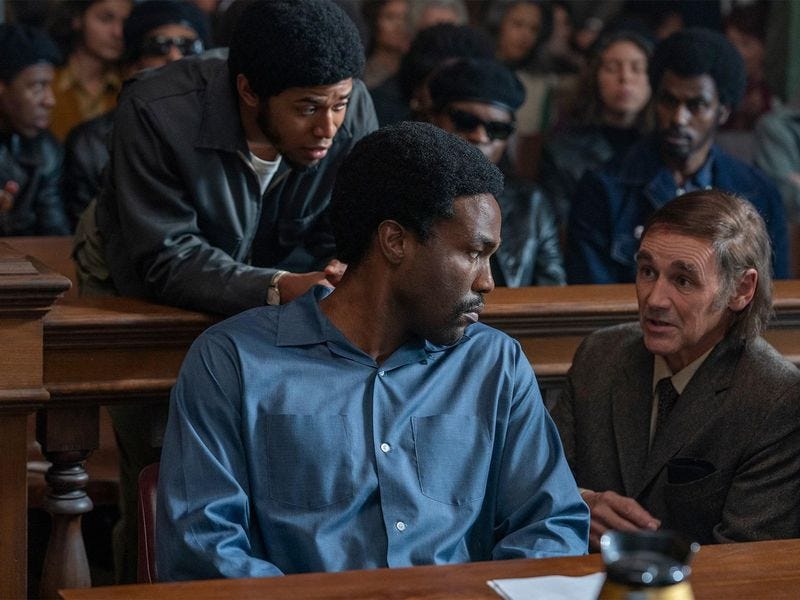
Another huge piece of this film that I believe was successful was the incorporation of the protest scenes throughout the trial. Sorkin makes you wait for these scenes and doesn’t just give them to you from the get-go. The film is centered around the trial with carefully placed flashes to the actual protests, which happened the year before the trial took place. The realities of protesting are brought to the screen without any censorship with clips from the actual protests in 1968 weaved in carefully. Sorkin really did not hold back on giving us all the real harsh realities of protesting including the horrifying effects of tear-gas, nightsticks, and even a protestor being sexually assaulted by men with opposing views. I think this approach in creating empathy towards protestors who, even now, are seen by some as violent attention-seeking hippies. The seriousness and dedication that protestors are giving towards their cause in pretty much any scenario become clear in The Trial of the Chicago 7 with really bloody scenes that depict police brutality (towards mostly white people). While I know that the Black population of America has experienced police brutality more seriously than any other group, I think that this depiction specifically could get more white people to believe how systemic the problems of brutality are. The protest scenes in this film were shocking and extremely well choreographed to the point where they immersed me in those moments completely.
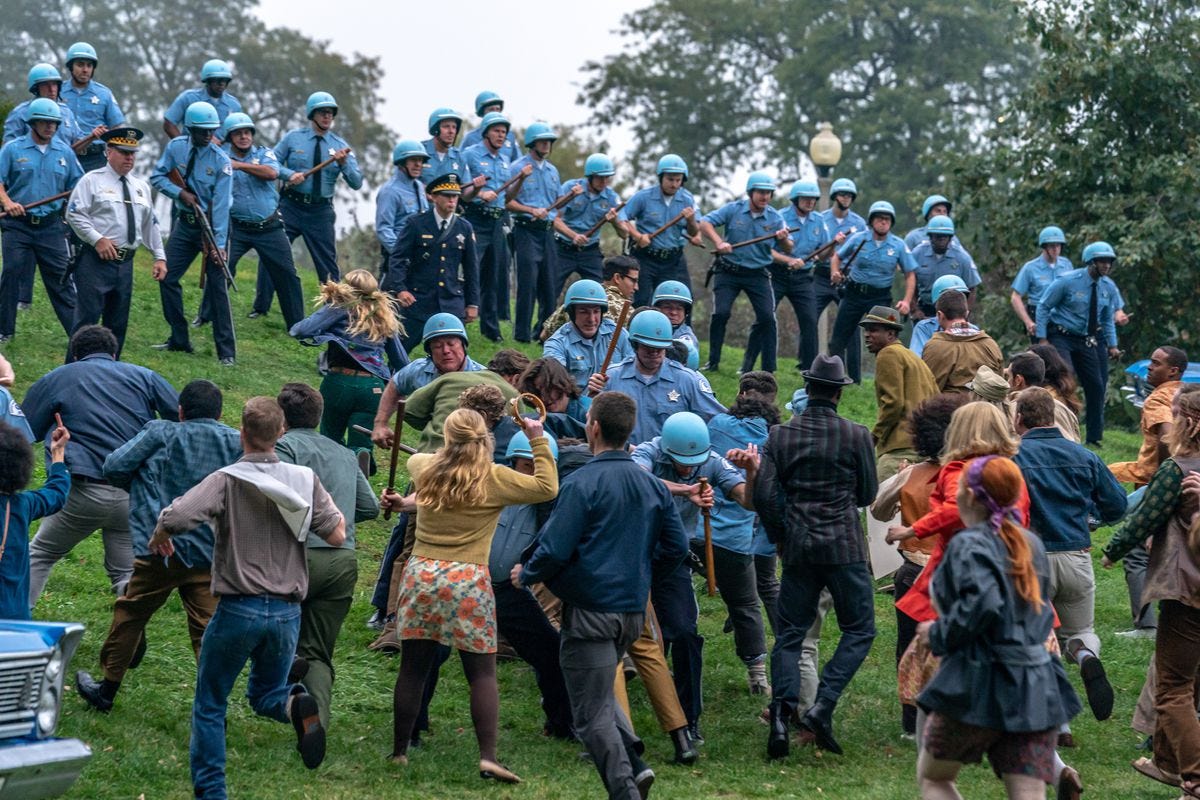
Overall, this film was a wonderful piece of political theatre. The drama of the courtroom paired with the intense protests that are shockingly similar to what we still see in the streets today was well written, excellently performed, and extremely relevant. This film was not the first time that this story has been told, and it probably won’t be the last. It was provocative and important, but not revolutionary by any means. I think that the general exposure and normalization of protesting is positive and will hopefully create less opposition to our basic freedoms of speech and protest going forward.
Movie Score: 4.0
Incluvie Score: 2.5
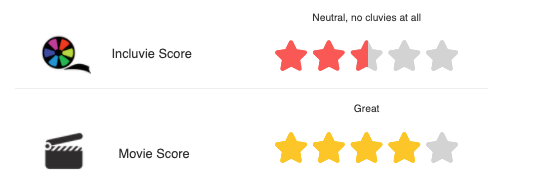
Movie Review originally published by Allie Posner on 2/5/2020
More to explore
By Same Author
Related lists created by the same author
By General Category
Related movie/TV/List/Topic
'Stargirl' Shows Self Expression Among Teenagers
Self expression among teenagers is explored in the live adaptation of Jerry Spinelli's novel of the same name.




